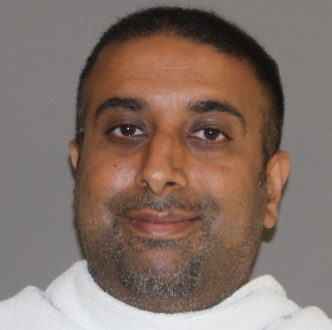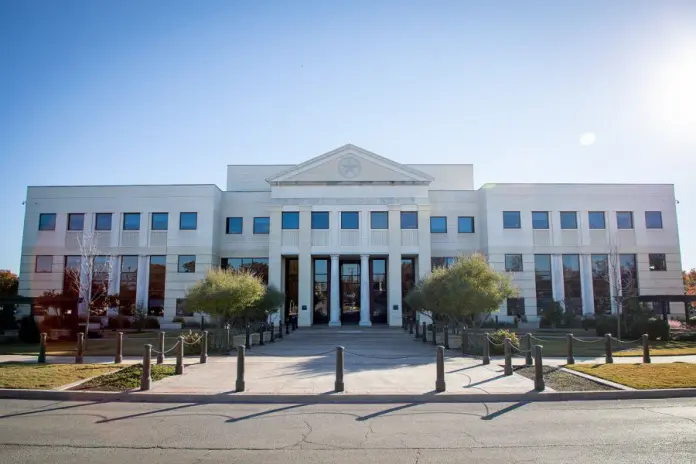A Denton County jury sentenced Zul Mirza Mohamed, 43, to four years in prison and 10 years of probation this week after he pled guilty to 25 counts of Method of Returning Ballot and 81 counts of Fraudulent Use of an Application for Ballot by Mail.
The sentence stems from Mohamed’s 2020 arrest in connection with the misuse of mail-in ballots for a Carrollton mayoral race for which he was a candidate. Mohamed forged ballot-by-mail applications under Carrollton residents’ names and had them sent to a Lewisville mail store where he leased a virtual mailbox using fake IDs.
The three-day jury sentencing trial in 462nd District Court could have resulted in punishment of two to 20 years in prison, fines, or probation. Mohamed remained in custody in Denton County Jail as of Friday afternoon.
“Today is a big day for election integrity in Denton County,” said Denton County Judge Eads. “I am so proud of the Denton County jury that stood up for election integrity and sentenced the defendant to four years in jail for stealing identities of Denton County residents and attempting to vote by mail in the 2020 general election.
“I am proud of our Denton County Elections Administration for catching the attempted fraud, for Sheriff Tracy Murphree and his team for thoroughly investigating the crime and bringing Mohamed to justice, and for our dedicated prosecutors for bringing it to the finish line.
“Election integrity is paramount, and the system worked,” Judge Eads said.
Jury Foreman Shannon Napier said after the hearing she has “way more confidence” in Denton County elections after listening to Elections Administrator Frank Phillips describe the process of checks and balances in verifying ballots and ballot mail-in applications in detail during testimony.
Several members of the jury, which came to its conclusion less than two hours after closing arguments, indicated afterward they reached a consensus quickly in the process and wanted to be fair by having a punishment for the crime while trying to help Mohamed with long-term mental health needs described during the court hearing testimony.
“This sends a message that we take our election process very seriously,” said Frank Phillips. “My staff trains continuously to ensure the entire process is handled with integrity and attention to detail from start to finish.”
In testimony, Phillips outlined how his team noticed multiple ballot applications being sought from the same address in Lewisville and immediately brought it to his attention.
Phillips testified that Denton County employees are trained to spot red flags in mail-in ballots and applications, which helped in the discovery of Mohamed’s attempts. Phillips also said the number of mail-in ballot applications in question was also concerning in that city council races can be very close, with single-digit votes determining the outcome. He cited one example with a mayoral race being decided by a two-vote difference in a runoff election.
Denton County uses hand-marked paper ballots for all elections, which is unique. “We want to ensure our elections are fair, accurate, and completed with integrity,” Phillips said. “What separates us from Third World Countries is our voting system.”

The jury, charged with returning a punishment sentence following Mohamed’s guilty plea on late Monday afternoon, listened to one-and-a-half days of testimony from law enforcement officers, elections administration, and several Carrollton voters whose personal information was used to obtain mail-in ballot applications. They also heard from a forensic psychologist, an adult probation supervisor, Mohammed’s family members and a friend.
In closing arguments, Assistant District Attorney Jesse Davis told the jurors “at the end of the day, this is a story of how the good people of Denton County stopped a man like Zul Mohammed from stealing an election.
“Whatever you choose – you choose for the citizens of Denton County. You represent 1 million people,” he said, adding it was the jury’s duty to ensure Mohammed paid a penalty for his crimes.
The Denton County Sheriff’s Office in conjunction with the Texas Attorney General’s Office, Texas Department of Public Safety, and the Lewisville Police Department arrested and charged Mohamed with 109 felonies related to voter fraud on Oct. 8, 2020. Three counts were later dropped.
In September 2020, Denton County Elections Administration staff first noted irregularities in several applications for ballots by mail and began reviewing additional applications. On Sept. 23, 2020, the Denton County Sheriff’s Office was made aware by the Elections Administration staff of possible fraudulent activities with absentee ballot applications. Absentee ballots had been requested to be sent to a P.O. Box in Lewisville, alleged to belong to a nursing home facility.
Investigators contacted Carrollton residents whose ballots had been requested and learned the residents had not requested any ballots be mailed to a virtual mailbox. Investigators learned the mailbox had been obtained with a fictitious Texas driver license and a fictitious University of North Texas student ID.
Investigators began a surveillance of the postal facility and inserted an undercover officer inside the facility. They also inserted a tracker in a box of specifically marked ballots requested by Mohamed. The ballots were marked to ensure they would not be processed.
On October 7, 2020, the box of the requested ballots was picked up by Mohamed at the facility. Investigators surveilled Mohamed and obtained a search warrant for his residence. They found an open box containing the requested ballots in his bedroom. A fraudulent Texas Driver License, fake insurance ID, and manufactured paper vehicle licenses, a box of Dallas County ballot applications, a fake notary stamp, and a lease to a second commercial mailbox in Plano were also located during the search.
Kyle Therrian, Mohamed’s attorney, had indicated to jurors that the election fraud was a result of mental health conditions and that he should only receive probation. During testimony, Dr. Kristi Compton, a Dallas clinical and forensic psychologist who was hired by Therrian to assess Mohammed, said he had grandiose and persecutorial delusions. Dr. Compton told jurors the diagnosis was difficult to treat, and suggested Mohamed would need to be compelled by the jury and judge to seek treatment, which was typical of individuals suffering from these types of delusions.
Several jurors indicated after the trial they believed a combined prison sentence and probation would potentially provide the help Mohammed would need as well as send a strong message to the public that voter fraud is unacceptable.




















